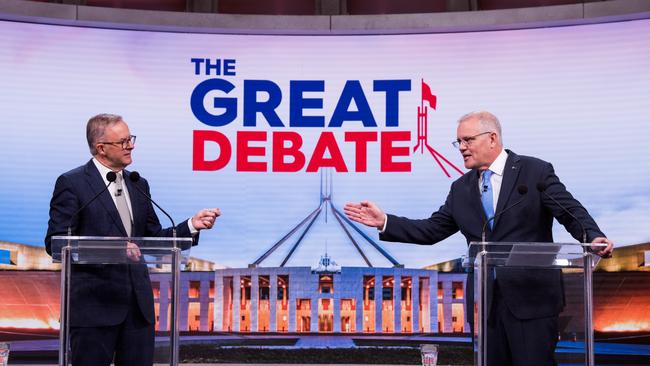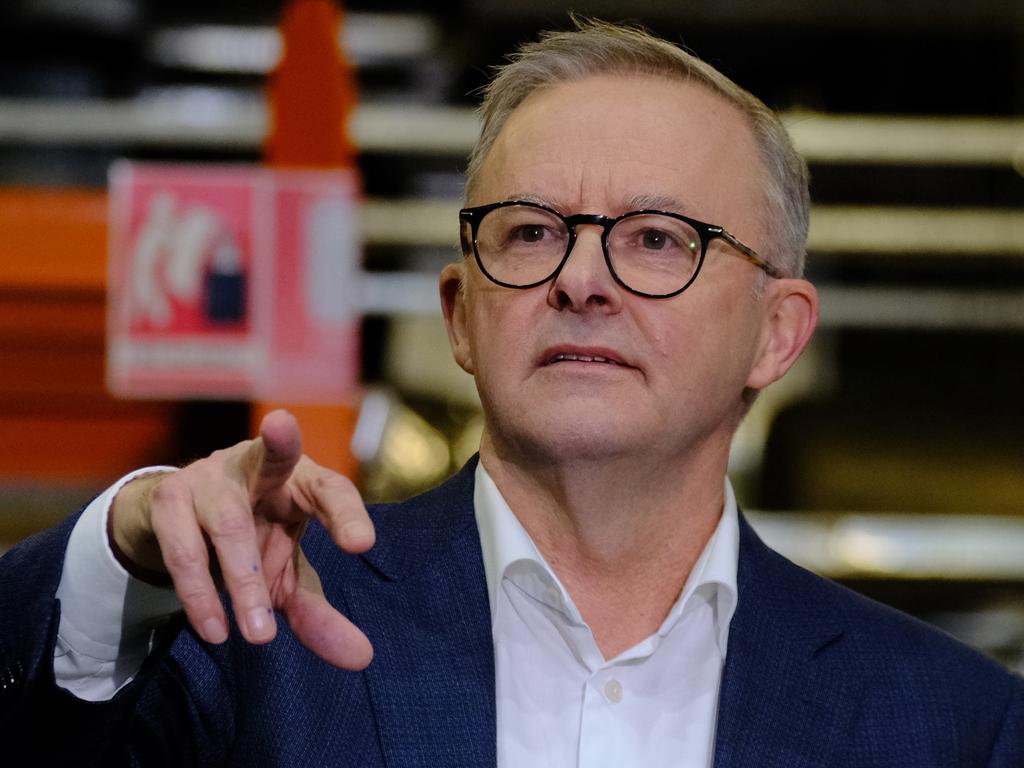
Governments cannot fix these issues. Leaders cannot deliver on pledges beyond their control. Australia is not a centralised economy. Prime ministers don’t determine the inflation rate; they don’t set real wages. There is a King Canute element to this campaign – as the king couldn’t stop the tide, neither can Morrison and Albanese stop price impacts no matter how many polls tell them this is the public’s central concern.
This election is defined by politics. Policy in any substantial way hardly rates. The old axiom that “good policy is good politics” is long dead in Australia. The sheer amount of discussion, rows, questions and answers about issues that cannot be controlled by whoever is prime minister is just extraordinary. Is the winner the leader best able to mislead the public on these questions?
In the 1980s it became fashionable to say the Australian public was savvy about economic policy. Nobody could say that today.
Yet the leaders’ debate on Sunday did see flashes of realism. Under pressure Albanese admitted he could not guarantee real wage increases and retreated to saying “we will try to do what we can in measures and structures to improve real wages”. Such realism seemed almost shocking. How much are Albanese’s pledges worth on cost of living?
The two leaders squabbled around guaranteeing that electricity bills won’t increase. But they cannot make such a guarantee. Wholesale prices have skyrocketed for months due to a mix of global factors, the Ukraine war and domestic pressures.
Some of this will translate post-election into higher retail prices – regardless of whether Morrison or Albanese governs. “There’s no magic wand to increase wages,” Morrison said after the debate. “There’s no magic pen that makes it all happen.” He’s right. In truth, weak wages have constituted a structural problem for many Western economies for years. The criticisms the leaders are imposing on each other also apply to themselves.
Cost-of-living pressures will continue after the election. The Reserve Bank projects headline inflation to rise and peak at 6 per cent this year, driven by, among other items, higher petrol prices. Regardless of whether Morrison or Albanese governs, households face a succession of post-election rate increases. Nothing will stop this. Inflation is not expected to return to 3 per cent until 2024 and that is optimistic.
The rising interest rate cycle has just begun, with the public long warned the shift away from “emergency” near free credit was inevitable, though the bank’s timing was hopelessly wrong. While wages will increase – with unemployment expected to fall to 3.5 per cent – they will not match inflation in the near term. Living standards will remain under pressure or falling.
The real story of this election is the limits about the pledges being made. That means when Morrison and Albanese put qualifications on their pledges about prices and wages they should be applauded for honesty, not denigrated by journalists.
This campaign is dominated by the chasm between the challenges Australia faces and the agendas being offered. The missing ingredient is bold, meaningful policy. Indeed, bold policy has been eliminated from our election contests. Our elections are no longer clearing houses for new national directions. They no longer serve that essential purpose by creating a mandate for policy change and renewal.
This election campaign did not fall intact from a bleak foggy sky. We have been heading here, election after election, for 15 years. It’s just getting worse. The core defect of our democracy is the inability of the election process to authorise necessary change. So living standards stagnate outside debt-incurred fiscal stimulus and monetary relaxation.
No substantive or transformative policy can be entertained. There is no formal carbon price to govern emission reduction investment certainty; no defined productivity agenda to address sustainable wage rises; no tax reform that boosts corporate investment or individual incentive by a tax-mix switch between the GST and personal taxes; no agenda to save enterprise bargaining; no mechanism to address overlap and inefficiency with the federation; no ability to discuss spending priorities given the deficit and debt outlook; and no framework to meet the challenge of demography as it impinges on the health and aged-care systems.
As economist Chris Richardson said: “Small target means small outcomes.” And small results guarantee an unhappy nation. That’s where we are heading post-election. Leaders should make a difference but our politics over 15 years has led inexorably to a smaller policy agenda with a weaker mandate for change. Progress is being stalled – with the risk voters will rebel, with disastrous consequences making the political logjam even worse.
Throughout the campaign Morrison’s strength has been his defence of his record – in managing the recession, fighting the pandemic and securing the economic recovery. These are world-leading results for Australia, leaving many Liberals baffled they now seemingly face defeat.
But Morrison’s problem is the absence of a fresh, forward-looking agenda for the future. His message about the future, in effect, is “more of the same” – that is, more of the past.
That doesn’t work when seeking a fourth term with an irritated public uninterested in yesterday.
Albanese, having worked for three years to become a small target, now feels the need to promote himself as a reforming figure of substance. That’s good. Pity it’s so late. But Albanese also looks to the past – seeking to bathe himself in the afterglow from Hawke-Keating and even Rudd-Gillard. But how credible is he?
“This is an economy crying out for reform,” Albanese said in his national productivity speech last week. He depicts himself as the leader offering “a new playbook to seize the future”. His approach seems mired in uncertainty and contradiction but is full of bravado. Australia has a 15-year-old productivity problem. How will Albanese solve it? He pledges to hold a Hawke-style employment summit to win consensus on changes. Sounds fine, but is Albanese really in the Hawke mould and could even Bob Hawke achieve consensus today?
Albanese’s policies involve laws for more secure work, support for the “better off overall” test that corrodes enterprise bargaining, buying Australian, financing tech-style jobs and seeking minimum wage rises that match rising inflation. At face value, some of these items must raise the alarm.
His big item is near universal childcare, and that should deliver labour market gains. But the risk is Labor will just repeat old mistakes: witness its huge funding of schools that delivered neither improved standards nor economic dividends. Perhaps the real progress will come on climate change but, as the Rudd-Gillard experience shows, Labor’s climate policy risks succumbing to treacherous political backlash.
If he wins, Albanese’s task will be daunting – seeking to fashion a new Labor reform agenda from the random pieces on his table, aware reform success has eluded past PMs for many years now.







The issue in the campaign is not the shouting between the leaders – it is the futile exchanges where Scott Morrison and Anthony Albanese make promises of varying conviction on cost of living, real wages and energy prices, assurances that cannot be delivered.